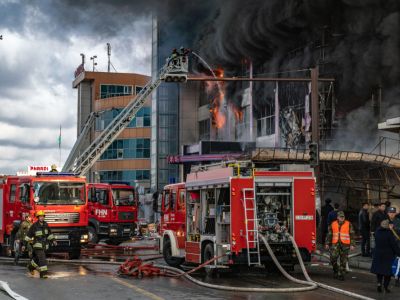US Defense Secretary Donald Rumsfeld Tuesday played down expectations of a major military offensive in response to the terrorist attacks against New York and Washington, saying there would be no "D-Day" to mark the start of the US campaign.
"It is by it's very nature something that cannot be dealt with by some sort of massive attack or invasion," he said. "It is a much more subtle, nuanced, difficult, shadowy set of problems."
Rumsfeld gave the operation a name -- "Enduring Freedom," selected after much vetting to convey the idea that "this is not a quick fix."
He said it would be long, difficult and dangerous campaign and "the likelihood is that more people may be lost."
"Needless to say, there is not going to be a D-Day, as such, and I'm sure there will not be a signing ceremony on the Missouri, as such," he said at a Pentagon news conference, referring to the battleship on which the Japanese surrender was signed at the end of World War II.
"This is not something that begins with a significant event or ends with a significant event. It is something that will involve a sustained effort over a good period of time," he said.
Rumsfeld and Secretary of State Colin Powell were to brief members of House and Senate on the campaign later in the day in an unusual set of closed door meetings on Capitol Hill, Pentagon officials said.
Deputy Defense Paul Wolfowitz, meanwhile, was heading to Brussels to brief NATO allies.
Rumsfeld said Washington also was holding discussions with Russia, which on Monday offered help in the form of access to its airspace, search and rescue, and aid to the Northern Alliance, an opposition force fighting Afghanistan's ruling Taliban.
US B-52 and B-1 bombers have been in place in the region since Monday, joining two aircraft carrier battle groups. Two other carriers, the USS Theodore Roosevelt and the USS Kitty Hawk, also converged on the region from west and the east -- WASHINGTON (AFP)
© 2001 Al Bawaba (www.albawaba.com)









